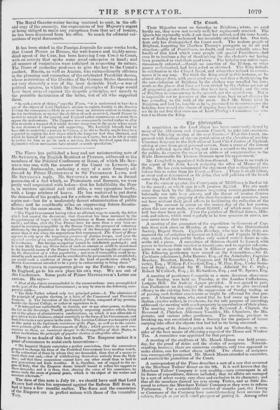It has been stated in the Foreign Journals for some
weeks back, that Count Pozzo DI BORG°, the well-known and highly-accre- dited agent of the Czar, has been hurrying f:om Court to Court, with an activity that spoke some great enterprise in hand; and all manner of conjectures were indulged in respecting its nature. The Times of yesterday professes to give the key to the Count's conduct. Russia, as well as Austria, was extraordinarily officious in the planning and concoction of the celebrated Frankfort decree, whose restrictions of the liberties of the German States threatened not very obscurely a war of the least desirable kind,—a war of political opinion, in which the liberal principles of Europe would have been arrayed against the despotic principles, not merely to the probable destruction of the latter, but of all who supported them.
" In such a state of things," says the Times, " it is understood to have been one of the objects of Lord Durham's mission to explain frankly to the Russian Cabinet the consequences likely to ensue from an intestine contest in Germany for free institutions, or against the abolition of such as existed, should France be invited to mingle in the quarrel, and England rather countenance or assist than oppose the malcontents. The Emperor was consequently invited rather to allay than to excite a tempest that might become dangerous to the party whose cause he was desirous of espousing and supporting. His Lordship himself, had he been able to undertake a journey to Vienna, as he did to Berlin, might have been requested to explain the new views which the Emperor had thus obtained, and which he himself had suggested to the German Courts; but as he felt it would be useless thy him to go on such a mission, the duty devolved upon that able diplomatist whose movements have created so much speculation."


























 Previous page
Previous page